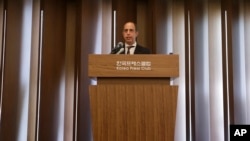A U.N. investigator Monday warned of serious consequences if COVID-19 gains a foothold in North Korea, and urged the government to accept international offers of help to contain the spread of the deadly virus. The investigator submitted a report on the North's human rights situation to the U.N. Human Rights Council.
The U.N. special rapporteur on the situation of human rights in North Korea, Tomas Ojea Quintana, said the lack of freedoms and wide-range abuses in the tightly controlled, highly secretive society run counter to the transparency needed to combat the coronavirus epidemic.
Ojea Quintana acknowledges the government’s extensive efforts in preventing an outbreak of this virus inside the North. He warns a widespread infection in North Korea would be devastating for the people as many are malnourished, suffering from stunted growth and are vulnerable to getting sick.
The U.N. official is calling on North Korea to allow full and unimpeded access to medical experts and aid workers and urges the government not to restrict access to vital information. The government in Pyongyang has not publicly disclosed any cases of COVID-19.
“Measures to contain and combat the spread of COVID-19, such as lockdowns and quarantines, as well as treatment of patients, should be carried out in strict accordance with human rights standards. Further isolation of the country is not the answer. The international community must respond accordingly and offer medical and scientific assistance,” he said.
The United States and other countries have imposed economic sanctions on North Korea because of its nuclear weapons program. Ojea Quintana said sanctions create economic hardships for the people and given the coronavirus crisis, they should be reviewed.
The U.N. rapporteur describes the overall human rights situation in North Korea as abysmal.
“Basic freedoms continue to be limited, control and surveillance are pervasive, and the population fears arbitrary arrest and mistreatment, including detention in political prison camps…A recent account refers to frequent deaths of prisoners due to hard labor, lack of food, contagious diseases and overcrowding,” he said.
Ojea Quintana said women are the most abused members of this repressive society. He said women are the primary caretakers of the household and are under pressure to provide money and labor to the government. He said women are vulnerable to threats, imprisonment and sexual abuse from local state officials. Additionally, he said they have no political power or recourse to justice.
The North Korean delegation boycotted the U.N. Council session and did not avail itself of its right of reply as the concerned country.





